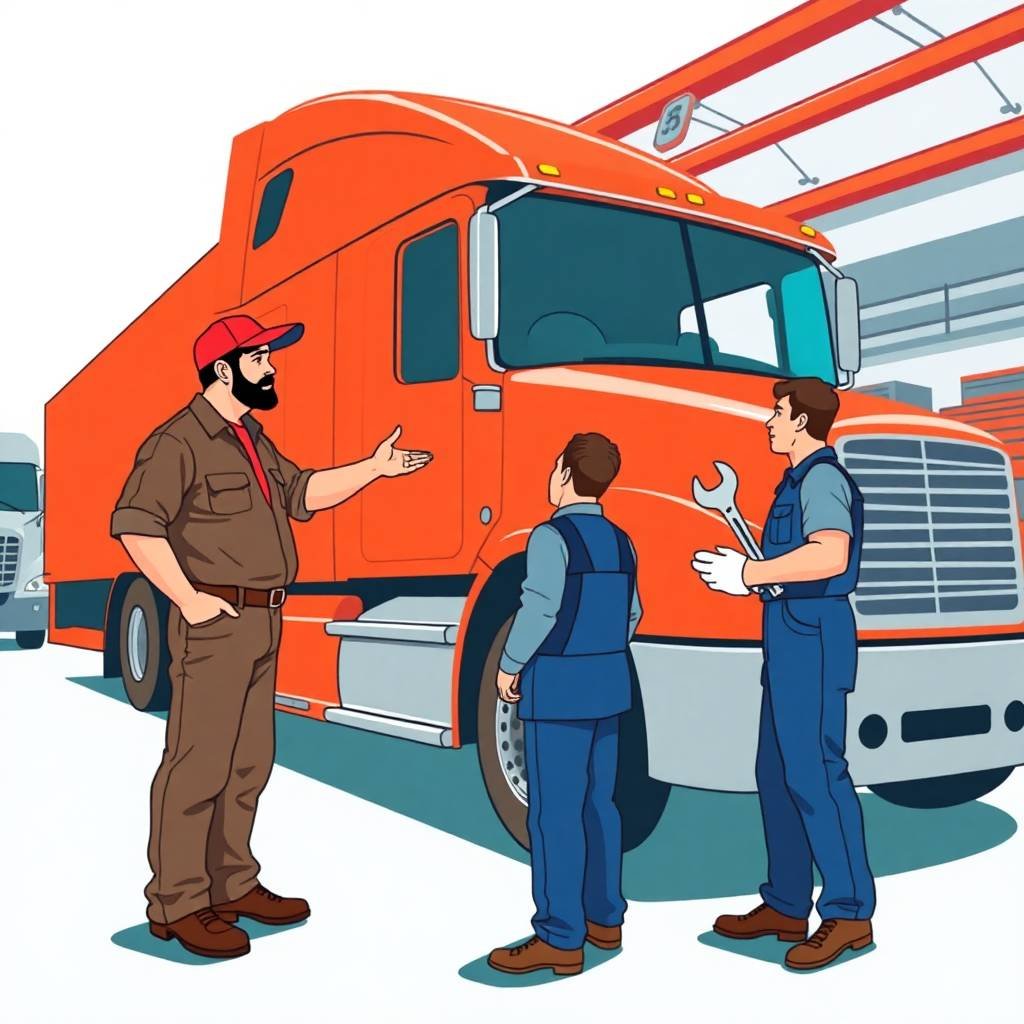1. Misunderstanding FMCSA Compliance for Non-CDL Drivers
When it comes to FMCSA Compliance for Non-CDL Drivers, many small fleets mistakenly believe that their obligations are less stringent than those required for CDL drivers. This misunderstanding can lead to serious compliance violations, fines, and costly audits. Understanding what’s required under the Federal Motor Carrier Safety Administration (FMCSA) is essential for non-CDL operations, especially when drivers operate vehicles over 10,000 pounds or transport hazardous materials.
The Hidden Compliance Burden
FMCSA Compliance for Non-CDL Drivers is often overlooked because small fleet owners assume that the absence of a Commercial Driver’s License reduces regulatory requirements. However, non-CDL drivers can still fall under the same rules concerning driver qualification files, hours of service, drug and alcohol testing, and more. Failure to understand these obligations can result in DQF violations and audit failures.
If you’re unsure whether your fleet qualifies, check out the official FMCSA website or Transportation.gov for clarification. Or, schedule a free compliance consultation with our experts to assess your risk exposure.
Drug and Alcohol Testing Misconceptions
Another common misunderstanding surrounding FMCSA Compliance for Non-CDL Drivers is the need for drug and alcohol testing compliance. Even if your drivers don’t hold a CDL, they may be required to participate in a compliant testing program if they operate qualifying commercial vehicles. Our drug and alcohol testing management service ensures your non-CDL fleet remains fully compliant.
Neglecting Pre-Employment and Random Testing
Some small fleet operators believe that non-CDL drivers don’t require pre-employment drug screening or random testing. This is a dangerous myth. According to pre-employment DOT drug testing requirements, all safety-sensitive positions must be vetted properly. Likewise, random testing requirements still apply, and failing to conduct them can lead to significant FMCSA penalties.
File Retention and Recordkeeping Mistakes
FMCSA Compliance for Non-CDL Drivers also involves thorough recordkeeping. From DOT audit preparation to routine file updates, small fleets must retain employment applications, driving records, and medical certificates for specified periods. If you’re not sure how long to keep these documents or how to organize them, use our DOT compliance checklist for owner-operators to stay on track.
Avoiding the Snowball Effect of Non-Compliance
One compliance error can quickly snowball. FMCSA Compliance for Non-CDL Drivers must be approached holistically, covering safety scores, UCR filings, and even BOC-3 support. Any lapse in these areas can result in violations, impacting your CSA scores and eligibility for future contracts.
Turn Confusion into Compliance
FMCSA Compliance for Non-CDL Drivers doesn’t have to be overwhelming. At Truckers Compliance Hub, we offer complete FMCSA compliance services for owner-operators and trucking companies. Whether you need help correcting violations, preparing for a new entrant safety audit, or understanding your compliance mistakes, we’re here to help.
To view more posts like this, visit our blog hub. Please also review our Disclaimer and Terms of Service for additional details.
Understanding the full scope of FMCSA Compliance for Non-CDL Drivers is your first step toward avoiding fines and maintaining a safer, more efficient fleet.

2. Skipping the Driver Qualification File (DQF) Requirements
For small fleet operators, especially those managing non-CDL drivers, skipping over FMCSA’s Driver Qualification File (DQF) requirements is a costly mistake. FMCSA Compliance for Non-CDL Drivers is not optional—it’s federally mandated and strictly enforced. Ignoring DQF requirements can lead to serious violations, penalties, and operational disruptions.
Why DQF Requirements Apply to Non-CDL Drivers
One of the most common misconceptions is that FMCSA Compliance for Non-CDL Drivers is less critical than for CDL holders. However, if your non-CDL drivers operate commercial motor vehicles over 10,001 pounds or transport hazardous materials, DQF regulations still apply. FMCSA guidelines clearly state that all qualifying drivers must have a properly maintained DQF, regardless of CDL status.
The Transportation.gov website also emphasizes the importance of documenting each driver’s safety and medical qualifications. Non-compliance in this area often results from misunderstanding, not malice—which is why it’s essential to schedule a compliance consultation if you’re unsure about your obligations.
What Must Be Included in a DQF
Every DQF must contain specific records, including driving history, employment applications, medical examiner certificates, and road test documentation. Skipping any of these documents means your file is non-compliant. If you need a breakdown, our Driver Qualification File Requirements guide outlines all necessary elements.
Small fleet operators often overlook these requirements until it’s too late—usually during a DOT audit or safety review. At Truckers Compliance Hub, we’ve helped countless carriers correct DQ file violations and avoid fines by rebuilding their compliance documentation from the ground up.
Consequences of Non-Compliance
Skipping DQF requirements can lead to serious consequences, including civil penalties and negative scores on the FMCSA Safety Measurement System (SMS). Worse, these violations can damage your company’s reputation and prevent you from securing new contracts. FMCSA Compliance for Non-CDL Drivers also intersects with drug and alcohol testing rules, making it essential to implement proper testing management programs.
How to Get Compliant Today
To ensure full FMCSA Compliance for Non-CDL Drivers, start with a DOT compliance checklist and review our owner-operator-specific version. Our services cover everything from driver safety score management to correcting violations, and from UCR filings to IFTA/IRP/BOC-3 support.
Understanding DQF requirements is just one step toward full compliance. Learn more about FMCSA compliance requirements for trucking companies and avoid repeating common compliance mistakes. If you’re newly established, our new entrant safety audit tips can guide you through the process.
Final Thoughts
Don’t let misinformation jeopardize your fleet. FMCSA Compliance for Non-CDL Drivers is as critical as it is for CDL operations. To avoid violations and secure your business’s future, take advantage of our FMCSA compliance services for trucking companies and owner-operators.
For additional insights, browse our blog and make sure to review our Disclaimer and Terms of Service for more information.
By understanding and complying with DQF requirements, your fleet will stay audit-ready, penalty-free, and fully aligned with FMCSA Compliance for Non-CDL Drivers.

3. Ignoring the FMCSA Clearinghouse for Pre-Employment Screening
When it comes to FMCSA Compliance for Non-CDL Drivers, one area that’s often overlooked—but critically important—is the FMCSA Drug and Alcohol Clearinghouse. Many small fleet operators mistakenly believe that because their drivers don’t hold CDLs, they are exempt from pre-employment drug and alcohol screening via the Clearinghouse. This misconception can result in serious violations, costly fines, and even out-of-service orders.
Understanding the Clearinghouse Requirements
The FMCSA Clearinghouse is a secure, online database that gives employers, the FMCSA, and state licensing agencies real-time access to drug and alcohol program violations. Even for non-CDL drivers operating vehicles over 10,001 lbs., FMCSA Compliance for Non-CDL Drivers includes adhering to all relevant drug and alcohol testing regulations—including pre-employment screening, as outlined in our pre-employment DOT drug testing requirements.
To help ensure compliance, Truckers Compliance Hub offers comprehensive drug and alcohol testing management solutions tailored specifically for small fleet operations.
Consequences of Ignoring the Clearinghouse
Non-compliance with FMCSA Clearinghouse rules can lead to serious DQ file violations and negatively impact your company’s safety score. If you’re flagged during an audit, failing to conduct the required Clearinghouse query for a new hire is a red flag. Our DOT audit preparation services are designed to help you avoid surprises during inspections or reviews.
Understanding the Clearinghouse’s role in FMCSA Compliance for Non-CDL Drivers is essential—not just for legal protection but for safeguarding public safety.
Integrating Clearinghouse Queries into Your Hiring Process
Making Clearinghouse queries a standard part of your hiring workflow is key. At minimum, all employers must run a full query on each new hire before they can perform safety-sensitive functions. Failure to do so violates FMCSA compliance requirements and can result in immediate penalties.
If you’re unsure how to integrate this into your process, schedule a 30-minute compliance consultation. We’ll walk you through the essential steps and help you implement a compliant, efficient pre-employment screening process.
Beyond Pre-Employment: Ongoing Responsibilities
FMCSA Compliance for Non-CDL Drivers doesn’t end after hiring. Employers are also responsible for conducting annual limited queries and ensuring enrollment in a compliant drug and alcohol testing program. Regular reviews using our DOT compliance checklist or owner-operator version can help identify gaps before they become costly errors.
For long-term compliance, check out our tools for driver safety score management and our guide to FMCSA compliance mistakes.
Protect Your Fleet with Proactive Compliance
The Clearinghouse is just one piece of a much larger compliance puzzle. From IFTA/IRP/BOC-3 support to UCR filing deadlines and CSA intervention thresholds, FMCSA Compliance for Non-CDL Drivers requires a proactive, structured approach.
To keep your business protected, explore our full range of services and resources, including how to correct FMCSA violations and our insights for surviving the new entrant safety audit.
For more expert insights, visit our homepage and browse the latest posts. You can also access additional help via FMCSA compliance help for trucking companies or services for owner-operators.
Please review our Disclaimer and Terms of Service for further details.
When it comes to FMCSA Compliance for Non-CDL Drivers, ignoring the Clearinghouse isn’t just a risk—it’s a liability. Take action now to protect your business, your drivers, and the public.

4. Overlooking Random Drug and Alcohol Testing Compliance
When it comes to FMCSA Compliance for Non-CDL Drivers, one of the most frequently ignored—and potentially damaging—requirements is random drug and alcohol testing. Many small fleet operators assume that non-CDL drivers are exempt from these protocols. This misconception can not only lead to FMCSA violations but can also endanger public safety and your company’s standing.
The Reality of FMCSA Requirements for Non-CDL Drivers
The Federal Motor Carrier Safety Administration (FMCSA) mandates that all drivers operating commercial motor vehicles (CMVs) weighing over 10,001 lbs. and engaged in interstate commerce must comply with its drug and alcohol testing regulations—regardless of whether they hold a CDL. This means FMCSA Compliance for Non-CDL Drivers includes participation in a compliant random drug and alcohol testing program.
To view more resources and compliance guides, visit the Truckers Compliance Hub blog for regular updates and in-depth explanations.
The Risks of Non-Compliance
Overlooking random testing requirements can result in serious DQ file violations and penalties during DOT audits. More importantly, it exposes your business to safety risks and liabilities that could lead to accidents and lawsuits.
To better understand how to prepare, our DOT audit preparation and compliance checklist for owner-operators can help you assess whether your program meets FMCSA standards.
Key Requirements for Random Testing
Under FMCSA rules, employers must randomly select and test drivers throughout the year. The selection must be scientifically valid, and tests must be spread reasonably across the calendar year. For those seeking guidance, our guide on random DOT drug testing requirements provides clear, actionable advice tailored for smaller fleets and non-CDL drivers.
Need help implementing a compliant program? Explore our drug and alcohol testing management services or schedule a consultation to get personalized support.
Why Random Testing Matters for Safety Scores and Audits
Failing to maintain a compliant random testing program can negatively affect your Safety Measurement System (SMS) scores and increase the likelihood of a CSA intervention. These scores are visible to both insurers and clients, making FMCSA Compliance for Non-CDL Drivers a matter of business reputation as well as regulation.
A Holistic Approach to Compliance
Random testing isn’t the only factor. Make sure you’re also compliant with driver qualification file requirements, pre-employment testing, and the FMCSA Clearinghouse.
Additionally, reviewing your practices with tools like our FMCSA compliance checklist and how to correct FMCSA violations guide ensures you’re not missing any critical steps.
Valuable Resources for Continued Compliance
To further support your efforts, explore these comprehensive guides:
You should also stay current with UCR filing deadlines, IFTA and IRP requirements, and new entrant safety audit tips.
For any legal information or limitations, refer to our Disclaimer and Terms of Service.
Ignoring random testing isn’t just a mistake—it’s a threat to your operation. Take charge of FMCSA Compliance for Non-CDL Drivers today, and ensure your program is audit-ready and legally sound.

5. Failing to Maintain Vehicle Inspection and Maintenance Records
In the world of commercial transportation, FMCSA Compliance for Non-CDL Drivers is often misunderstood or overlooked—especially when it comes to maintaining proper vehicle inspection and maintenance records. Many owner-operators or small fleet managers wrongly assume that these requirements only apply to CDL drivers. In reality, the Federal Motor Carrier Safety Administration (FMCSA) enforces recordkeeping rules for all commercial motor vehicles over 10,001 pounds, regardless of CDL status.
Why Maintenance Records Matter
At the heart of FMCSA Compliance for Non-CDL Drivers is safety. Properly maintained vehicles reduce the risk of mechanical failures that can lead to accidents, road violations, and costly repairs. The U.S. Department of Transportation requires all carriers to document inspections, repairs, and maintenance in compliance with FMCSA regulations.
Failing to maintain these records may result in citations during roadside inspections or DOT audits. These violations can also negatively affect your Safety Measurement System (SMS) score, triggering CSA intervention thresholds and increasing your risk profile.
Recordkeeping Requirements for Non-CDL Operations
Non-CDL carriers must keep detailed records of regular inspections, preventive maintenance, and any corrective actions taken. This includes:
- Annual inspections and documentation
- Driver Vehicle Inspection Reports (DVIRs)
- Preventive maintenance logs
- Repair records for safety-critical defects
To ensure your operation aligns with federal expectations, review our DOT compliance checklist for owner-operators or our comprehensive compliance checklist.
Consequences of Poor Documentation
Non-compliance doesn’t just lead to fines. It jeopardizes your reputation, business partnerships, and legal standing. In many cases, failure to keep proper records results in FMCSA compliance mistakes that could have easily been avoided. Our how to correct FMCSA violations guide can help you remediate issues before they escalate.
Maintaining clean and organized maintenance files also supports your driver safety score management, an essential element of your FMCSA compliance strategy.
Stay Ahead with Proactive Support
FMCSA Compliance for Non-CDL Drivers requires vigilance across all areas of operation—from drug and alcohol testing compliance to DQ file management. And yes, that includes your pre-employment testing procedures, random drug testing programs, and FMCSA Clearinghouse compliance.
Explore our full suite of services, including:
- IFTA, IRP & BOC-3 Support
- Drug and Alcohol Testing Management
- UCR Filing Assistance
- New Entrant Safety Audit Survival Tips
If you’re unsure where to start, our FMCSA compliance services for owner-operators offer practical solutions tailored to your business. For personalized guidance, schedule a consultation today.
Access More Resources and Legal Info
Visit our blog for the latest FMCSA compliance posts or browse through our detailed resources like FMCSA Compliance Help for Trucking Companies and owner-operator services.
Before implementing any compliance strategies, be sure to review our Disclaimer and Terms of Service.
Don’t let missing inspection and maintenance records threaten your business. Prioritize FMCSA Compliance for Non-CDL Drivers and keep your operation on the road to success.

6. Not Using a DOT Compliance Checklist Tailored for Small Fleets
Many small fleet operators underestimate the complexity of FMCSA Compliance for Non-CDL Drivers, assuming that minimal oversight or low driver counts reduce their compliance burden. In reality, failing to use a DOT compliance checklist tailored for small fleets is one of the most common and costly mistakes. Without a clear framework, essential regulatory steps are often missed, leaving your operation vulnerable during audits or inspections.
Why a Tailored DOT Compliance Checklist Is Critical
Small fleets, especially those with non-CDL drivers operating vehicles over 10,001 pounds, are still subject to FMCSA and Department of Transportation (DOT) rules. A generic checklist designed for large fleets often overlooks the nuances of FMCSA Compliance for Non-CDL Drivers. That’s why utilizing a customized DOT compliance checklist ensures nothing slips through the cracks—from driver qualification files to drug and alcohol testing compliance.
At Truckers Compliance Hub, we provide tools and checklists specifically designed for owner-operators and small fleets that don’t operate CDL-required vehicles but are still bound by FMCSA rules.
Areas Small Fleets Commonly Overlook
Without a proper checklist, non-CDL carriers often overlook key areas of compliance, including:
- Driver qualification file requirements
- Random drug and alcohol testing programs
- DQ file violations
- Vehicle inspection and maintenance logs
Neglecting these elements can result in penalties, safety alerts in the FMCSA’s Safety Measurement System, or failed new entrant audits. To avoid costly outcomes, use our comprehensive DOT audit preparation service.
The Role of FMCSA Compliance for Non-CDL Drivers
The growing enforcement of FMCSA Compliance for Non-CDL Drivers means that even smaller operators must pay attention to evolving regulations. From pre-employment testing to maintaining Clearinghouse compliance, staying on top of your obligations is critical. Explore our driver drug and alcohol testing program to stay compliant year-round.
You can also use our drug and alcohol testing management service to streamline your processes.
Support for Small Fleets That Want to Stay Ahead
If you’re managing a small fleet, you don’t have to do it alone. We offer tools to help you with:
- How to correct FMCSA violations
- CSA intervention thresholds
- IFTA, IRP, and BOC-3 support
- UCR filing deadlines
Explore more on FMCSA compliance help for trucking companies and our FMCSA compliance services for owner-operators. You can also schedule a free consultation to review your specific needs with our compliance experts.
Stay Informed and Compliant
Stay updated on compliance tips and news by visiting our blog regularly. Review our Disclaimer and Terms of Service to understand the scope of information and services provided.
Don’t let avoidable oversights cost your business. With the right FMCSA Compliance for Non-CDL Drivers strategy, including a tailored checklist, your small fleet can stay on the road and in full regulatory compliance.

7. Underestimating Record Retention Requirements
When it comes to FMCSA Compliance for Non-CDL Drivers, one of the most frequently overlooked areas is proper record retention. Many small fleet operators and owner-operators assume that non-CDL operations are exempt from stringent documentation standards. However, the Federal Motor Carrier Safety Administration (FMCSA) requires even non-CDL drivers to maintain specific records for extended periods. Failure to comply can result in penalties, failed audits, and possible out-of-service orders.
Understanding the Scope of Record Retention
Proper documentation is a cornerstone of FMCSA Compliance for Non-CDL Drivers. The Department of Transportation mandates that carriers retain records such as driver qualification files, pre-employment drug testing results, random drug and alcohol test results, and maintenance logs for specific timeframes—often three to five years.
These records must be readily accessible during a DOT audit or compliance review. To avoid violations, using a DOT compliance checklist tailored for owner-operators can help ensure you’re not discarding essential documents prematurely.
Consequences of Inadequate Recordkeeping
In our experience at Truckers Compliance Hub, failing to maintain proper records is one of the top FMCSA compliance mistakes. This lapse can lead to DQ file violations, disqualification of drivers, or negative outcomes during new entrant safety audits. If your documentation doesn’t meet FMCSA compliance requirements for trucking companies, you may face intervention under the CSA Safety Measurement System.
Our team offers DOT audit preparation services that can help review and organize your recordkeeping systems before an audit becomes an issue. We also help businesses correct FMCSA violations after the fact, but prevention is always the best approach.
FMCSA Compliance for Non-CDL Drivers: A Documentation-Driven Process
Even non-CDL operators must follow strict retention rules related to drug and alcohol testing compliance, including maintaining a compliant driver drug and alcohol testing program. Leveraging our drug and alcohol testing management service ensures you maintain all necessary documentation for the required duration.
Additionally, managing UCR filings, BOC-3 forms, and driver safety scores also requires accurate and retained documentation for audit readiness.
How to Stay Compliant
Staying compliant starts with having the right resources. Visit our blog for the latest posts, guides, and insights. Need help now? Schedule your free consultation with one of our compliance experts to assess your document retention practices and ensure your fleet is protected.
Explore our full suite of FMCSA compliance services for owner-operators and compliance help for trucking companies to find the solutions best suited to your operation. Whether it’s understanding your obligations or navigating a compliance audit, our team is ready to support your goals.
Please review our Disclaimer and Terms of Service for more details on our services and guidance.
Don’t underestimate the role that proper document retention plays in FMCSA Compliance for Non-CDL Drivers. With the right approach and expert support, your records will be an asset—not a liability.

What exactly does FMCSA Compliance for Non-CDL Drivers involve?

FMCSA Compliance for Non-CDL Drivers includes maintaining complete Driver Qualification Files (DQFs), conducting pre-employment checks, ensuring proper vehicle inspections, and adhering to drug and alcohol testing protocols—even if your drivers don’t hold a CDL. Small fleets must also comply with Unified Carrier Registration (UCR) and other federal filing requirements. If you’re unsure where to begin, our UCR filing assistance can help guide you through essential steps to remain compliant.
Are non-CDL drivers required to be part of a drug and alcohol testing program?

Yes, under specific conditions, non-CDL drivers are subject to the same drug and alcohol testing rules as CDL drivers, especially if operating vehicles over 10,000 lbs. FMCSA Compliance for Non-CDL Drivers requires small fleets to assess each driver’s role and enroll them in a compliant testing program if needed. Our drug and alcohol testing management service helps ensure full compliance and protects your fleet from violations.
What kind of records do I need to keep for non-CDL drivers to stay FMCSA compliant?

You must retain Driver Qualification Files, vehicle maintenance logs, hours-of-service records (if applicable), and drug testing documentation. FMCSA Compliance for Non-CDL Drivers also means having processes in place for ongoing file updates. To make this easier, check out our DQ file setup and monitoring service, which ensures your records meet FMCSA standards year-round.
How can I avoid DQF-related violations with my non-CDL drivers?

Violations often occur due to incomplete or outdated Driver Qualification Files. FMCSA Compliance for Non-CDL Drivers requires that each driver’s file include employment history, driving record checks, and medical certifications. To avoid penalties during audits, consider using our professional DQ file setup and monitoring to manage these files accurately and efficiently.
Do non-CDL drivers need to be prepared for a DOT audit?

Absolutely. Non-CDL drivers and the fleets that employ them are subject to DOT audits just like CDL operations. FMCSA Compliance for Non-CDL Drivers includes being audit-ready with properly retained documentation and processes. If you’re not sure how to prepare, start with our expert-led DOT audit preparation services to avoid costly compliance issues.
Igor Iturriaga is a transportation compliance expert and founder of Dynamic 305 Miami LLC. He helps owner-operators and fleets stay FMCSA-compliant and audit-ready. https://www.linkedin.com/in/igor-iturriaga-64503217/
